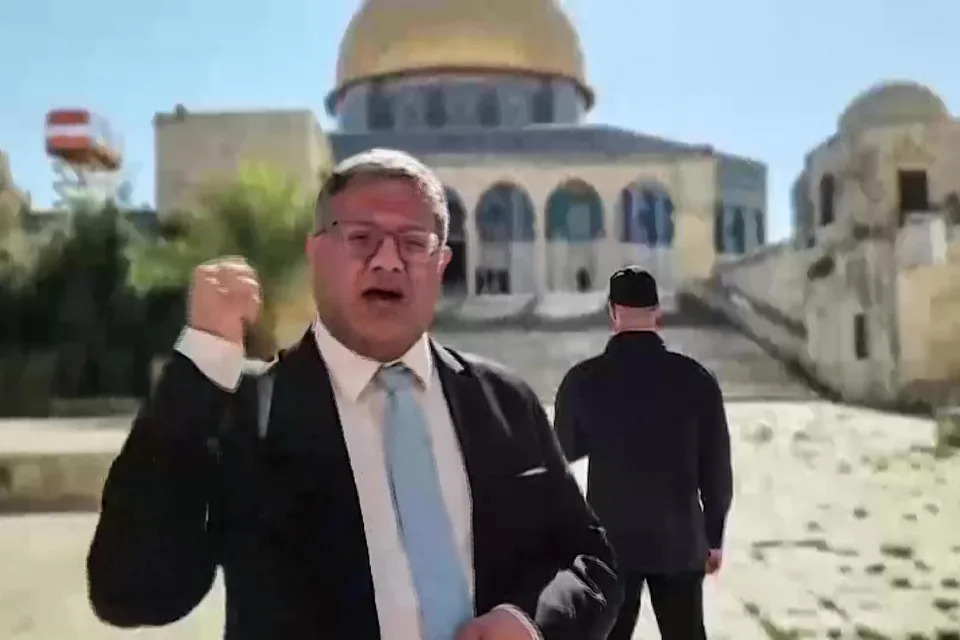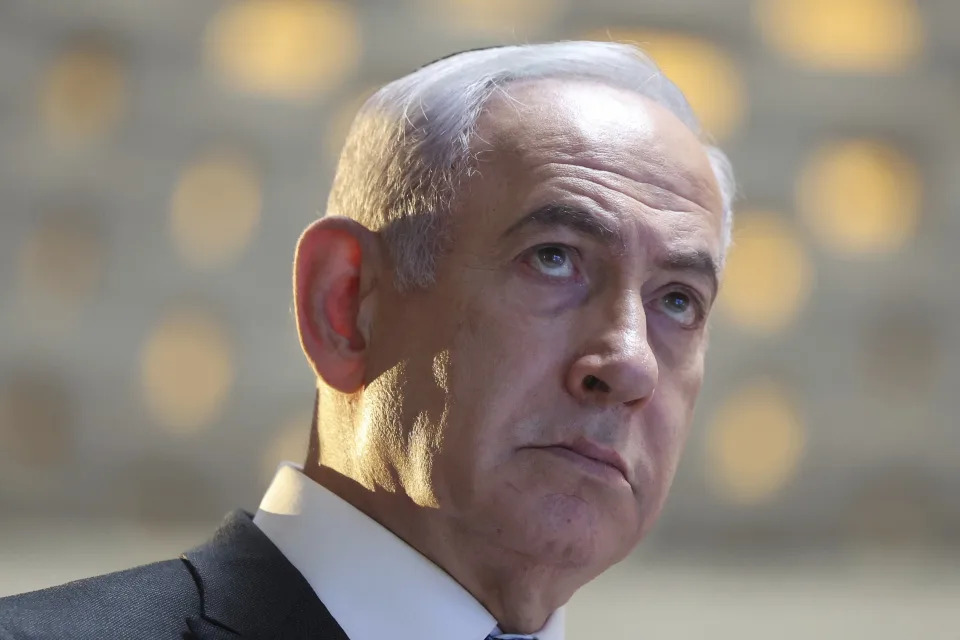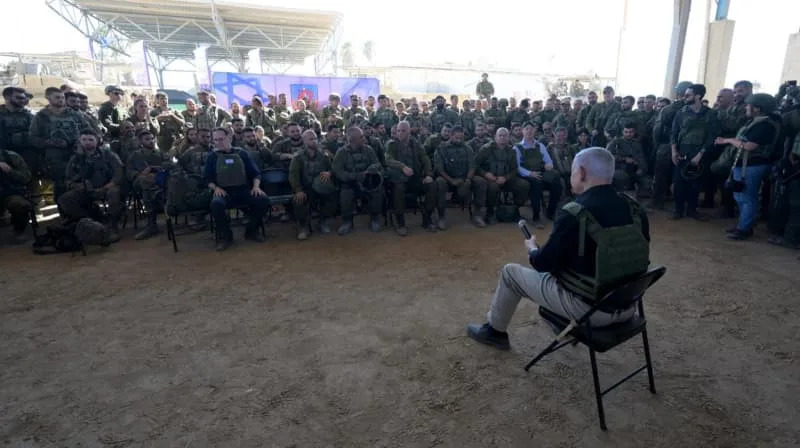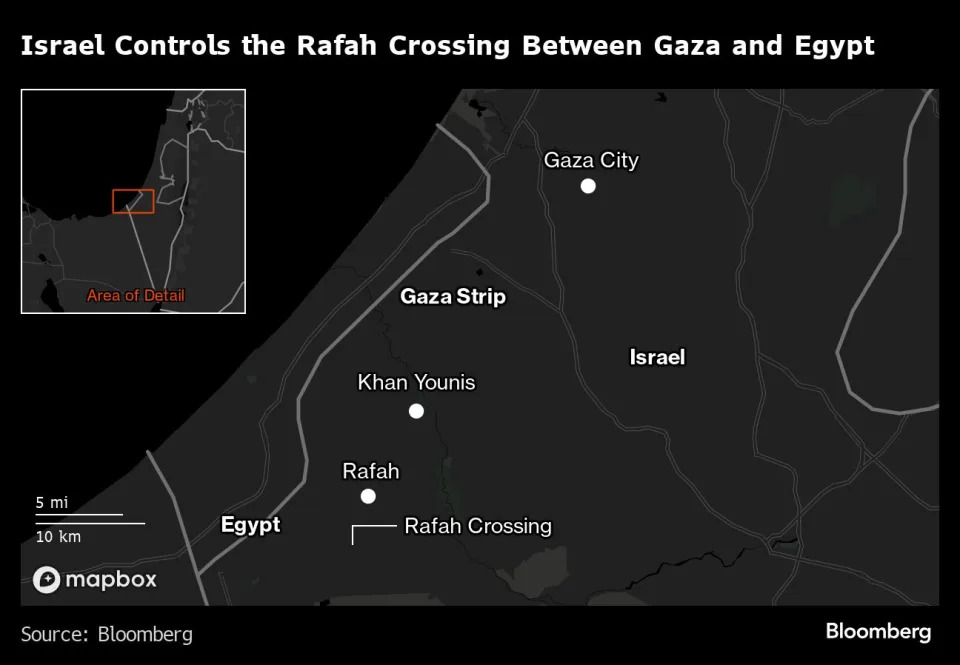Israeli Prime Minister Benjamin Netanyahu made a surprise visit to troops in southern Gaza on Thursday, saying it was essential that Israel keep control of a strip of territory along the territory's border with Egypt, just days before he was set to give a speech to the U.S. Congress.
In his comments at Gaza's southernmost city of Rafah, Netanyahu sounded a tone of triumph in the campaign against Hamas — and underscored the differences that still remain in monthslong attempts to reach a cease-fire.
A U.S.-backed outline for a deal calls for an eventual full Israeli withdrawal from Gaza in return for a full release of hostages by Hamas, something a continued Israeli grip on the Rafah border crossing and nearby border strip would appear to contradict.
Netanyahu’s visit to Rafah was announced hours after Israel’s far-right national security minister, Itamar Ben-Gvir, visited Jerusalem’s most sensitive holy site. Ben Gvir's move also could disrupt the talks over a cease-fire in the 9-month-old Israel-Hamas war.
Ben-Gvir, an ultranationalist settler leader, said he went up to the flashpoint site to pray for the return of Israeli hostages “but without a reckless deal, without surrendering.” Israeli negotiators landed in Cairo on Wednesday to keep working on the talks.
Tensions over the compound have fueled past rounds of violence. The Palestinian Foreign Ministry condemned Ben-Gvir’s visit as a “provocative intrusion” that endangered the fragile status quo regarding the Jerusalem compound, which is revered by Jews as the Temple Mount and by Muslims as Haram al-Sharif, a holy site and important national symbol.
The two leaders’ visits came hours after Israel’s parliament overwhelmingly passed a resolution rejecting the establishment of a Palestinian state. The vote, in an overnight session that lasted into Thursday morning, was largely symbolic and meant to send a message ahead of Netanyahu’s trip to the United States.
Netanyahu's office announced his visit to Rafah once the prime minister had exited the war-torn Palestinian territory. Israeli forces invaded Rafah in early May, forcing most of the 2 million Palestinians sheltering there to flee. Rafah, once a crucial entry point for humanitarian aid, is now a dusty ghost town full of bullet-riddled apartment buildings with blasted-out walls and shattered windows. Very few civilians remain, even as the ground operation continues.
Netanyahu toured the Rafah crossing with Egypt and from a viewpoint saw the Philadelphi corridor, a narrow strip running the length of the Gaza side of the border with Egypt. The Israeli military seized control of both early in the Rafah assault, and it says that since then troops have uncovered Hamas smuggling tunnels into Egypt.
Netanyahu said his talks with troops and commanders had made him “stronger in the understanding that our control of the Philadelphi corridor and of the Rafah crossing are essential going forward," his office said in a statement.
Israeli leaders have signaled that the Rafah operation is close to finished — a step that is expected to lead to a new, lower-intensity phase of the war and could possibly improve conditions for a cease-fire. Israel has previously said Rafah was Hamas’ last major stronghold in Gaza.
But differences still remain in the talks over the three-phase deal, which starts with a halt in fighting and a partial hostage release. The outline says the deal is to lead to an end to the war and complete Israeli withdrawal — a top Hamas demand for a full hostage release. But it also says the two sides must negotiate the terms for that during the initial cease-fire phase. Hamas wants stronger guarantees, while Israel has suggested it will demand Hamas be removed from power in those negotiations.
In his comments in Rafah, Netanyahu also said Israel demands “a maximum number of hostages” to be released in the first phase. That's likely to fuel Hamas' suspicions he aims to get out as many hostages as possible and then resume fighting.
Overnight Israeli strikes Thursday in central Gaza killed at least 11 people, according to the Hamas-run Civil Defense organization and hospitals. At least two children and two women were killed in air strikes on a house and a car.
In recent weeks, Israel has stepped up strikes in central Gaza, where many Palestinians have fled to escape fighting in other parts of the beleaguered territory. Israel’s military said it targeted a senior commander from the militant Palestinian group Islamic Jihad’s naval forces in Gaza City, and another Islamic Jihad commander responsible for launches in the city of Shijaiyah.
Ben-Gvir said Thursday while standing in front of the iconic golden Dome of the Rock in the Al-Aqsa Mosque compound that he “is praying and working hard" to ensure that Netanyahu will not give in to international pressure and will continue with the military campaign in Gaza. Ben-Gvir has frequently visited the site during times of conflict, drawing condemnation. He last visited the site in May to protest countries unilaterally recognizing Palestinian statehood.
As security minister, Ben-Gvir oversees the country’s police force. As a key coalition partner, Ben-Gvir also has the power to rob Netanyahu of his parliamentary majority and try to force early elections.
Ben-Gvir has used his influence to push forward pet projects and encourage Netanyahu to press ahead with the war in Gaza in the face of widespread calls to reach a cease-fire deal that would bring home hostages.
He has been convicted eight times for offenses that include racism and supporting a terrorist organization. As a teen, his views were so extreme that the army banned him from compulsory military service.
On Friday, the U.N.'s International Court of Justice is expected to issue an advisory opinion on the legality of Israel’s 57-year occupation of the Palestinian territories, an ongoing legal case not connected to the current Israel-Hamas war.
Israel also said it killed a senior commander affiliated with Hamas and other militant groups in Lebanon. In a statement, Sunni al-Jamaa al-Islamiya, or the Islamic Group, identified him as Mohammad Hamed Jabbara and said he was killed in a strike in the western Bekaa area in Lebanon not far from the Syrian border. The Israeli military described Jabbara as a Hamas operative in Lebanon who helped coordinate Islamic Group attacks targeting northern Israel.
The war in Gaza, which was sparked by Hamas’ Oct. 7 attack on southern Israel, has killed more than 38,600 people, according to the territory’s Health Ministry, which does not distinguish between combatants and civilians in its count. The war has created a humanitarian catastrophe in the coastal Palestinian territory, displaced most of its 2.3 million population and triggered widespread hunger.
Hamas’ October attack killed 1,200 people, mostly civilians, and militants took about 250 hostage. About 120 remain in captivity, with about a third of them believed to be dead, according to Israeli authorities.
AfriPrime App link: FREE to download...
https://www.amazon.com/Africircle-AfriPrime/dp/B0D2M3F2JT
Israel's Netanyahu visits troops in Rafah as Amnesty condemns torture
Israeli Prime Minister Benjamin Netanyahu speaks to Israeli soldiers during a visit to the southern city of Rafah in Gaza.
Israeli Prime Minister Benjamin Netanyahu paid a surprise visit to Israeli troops in southern Gaza on Thursday, as human rights organization Amnesty International accused Israel of torturing Palestinian prisoners.
During the photo opportunity, Netanyahu reiterated his demand that the Israel military must remain in the southern Gaza city of Rafah on the border to Egypt, even after a possible ceasefire with the Palestinian militant group Hamas.
The demand is seen as an obstacle to ending the conflict in Gaza, which emerged after the October 7 attacks and has produced a massive humanitarian toll.
In a video released by his office, Netanyahu said he felt strengthened in his conviction that control of the Philadelphi Corridor - an Israeli name for the 12-kilometre strip of border territory separating Rafah and Egypt - and the Rafah border crossing are essential for Israel's fight against Hamas.
Israel has warned that Hamas is able to smuggle weapons, goods and money through tunnels running under the border with Egypt. The Rafah border crossing, meanwhile, has been closed since Israeli troops occupied it in May.
Egypt, which along with Qatar and the United States is mediating in indirect negotiations between Hamas and Israel, is strictly opposed to Israel retaining control of the Rafah crossing.
The main aim of the negotiations, which have been ongoing for months and have repeatedly stalled, is to bring about a ceasefire in the Gaza war and to exchange Israeli hostages for Palestinian prisoners in Israeli jails.
However, most of the 120 hostages held by Hamas are no longer believed to be alive.
Amnesty denounces Israeli mistreatment of prisoners
Meanwhile, London-based Amnesty on Thursday accused Israel of mistreating and torturing Palestinian prisoners.
Under the Unlawful Combatants Law, Israel systematically detains Palestinians "incommunicado," the group said, with the detainees being denied access to lawyers or contact with their families.
The report, based on interviews with 27 Palestinians including five women and a 14-year-old boy, includes allegations of torture, enforced disappearance, and cruel, inhuman or degrading treatment by Israeli forces.
One man, a 57-year-old paediatrician detained during a raid on a hospital in Gaza City in December 2023, said he was kept handcuffed and blindfolded for 45 days at a military camp, while suffering starvation and beatings.
Israel has not commented on the allegations in the report. It has previously denied accusations of torture and mistreatment of Palestinian prisoners.
The Amnesty report criticized the Unlawful Combatants Law, which has been extended a number of times since October 7.
The group said that Israel is sidestepping international human rights conventions by labelling the detainees "unlawful combatants."
Amnesty said it is "calling for all detainees held under the Unlawful Combatants Law, including suspected members of armed groups, to be treated humanely and given access to lawyers."
Far-right minister causes stir
Also on Thursday, far-right Israeli National Security Minister Itamar Ben-Gvir once again caused a stir with a visit to a contested holy site in Jerusalem.
He said in a video shot on-site and published on the social media platform X that he was praying and working hard for Prime Minister Benjamin Netanyahu, so he might have the strength not to give in during the Gaza war, to increase military pressure and to achieve victory.
He said he had come to the site known to Jews as the Temple Mount and to Muslims as the Noble Sanctuary to pray for the hostages and their return "without a reckless deal, without surrender."
Ben-Gvir has repeatedly threatened to leave the coalition if Netanyahu agrees to a deal to release the hostages with the Palestinian Islamist movement Hamas, which would also end the war.
Netanyahu is reliant for his political survival on his ultra-religious and far-right coalition partners, who refuse to compromise in the negotiations with Hamas.
Critics accuse Netanyahu of sabotaging indirect talks with the Islamists for this reason. Recently, Netanyahu said Israel would extract further concessions from Hamas through increased military pressure. Hamas is said to have already shown flexibility on some of its positions.
The Jordanian Foreign Ministry condemned the minister for his visit to the holy site, which Ben-Gvir has done several times since taking office, always drawing international criticism.
The plateau contains the Dome of the Rock and the al-Aqsa Mosque is the third holiest site in Islam. However, it is also sacred to Jews because two Jewish temples once stood there.
The sanctuaries on the site are managed by a Jordanian foundation, while Israel is responsible for security. According to an agreement with the Muslim authorities, Jews are allowed to visit the complex but not to pray there. However, there are frequent violations of this agreement.
AfriPrime App link: FREE to download...
https://www.amazon.com/Africircle-AfriPrime/dp/B0D2M3F2JT
Israel Considers Letting EU, Palestinians Control Rafah Crossing
Israeli officials are considering transferring control of Gaza’s Rafah border crossing to the European Union and Palestinians, according to people familiar with the matter.
Though Prime Minister Benjamin Netanyahu has scorned the idea of Israel ceding the crossing, Israeli officials are in talks with the EU and US about the proposal, the people said. If enacted, it could foreshadow an end to the conflict between Israel and Hamas and enable more aid to get into the devastated Palestinian territory, said the people, who asked not to be identified discussing the sensitive talks.
The negotiations underscore the EU’s renewed diplomatic efforts to relieve some pressure on Palestinian civilians and help stop the war. The bloc has for months called for a truce but had little influence over the Israeli government as it tries to destroy Hamas.
Brussels helped run the crossing before 2007, when Hamas took control.
Netanyahu has said that whatever Israel does, Hamas won’t be allowed to retake control of any border areas. His government also insists on Israel’s troops remaining in the vicinity of the crossing and along the Gaza-Egypt border.
After a visit to Rafah on Thursday, Netanyahu said it was “vital” to hold the the Philadelphi Corridor and the Rafah crossing. The Philadelphi Corridor is the southern portion of Gaza that runs along the border with Egypt.
The prime minister has previously clashed with his generals over the crossing, according to an Israeli official. They are more inclined than Netanyahu — who will have the final say — to reopen it, the official said.
The crossing linking Gaza and Egypt has become a key source of tension in recent months between Israel and Palestinian authorities, as well as the Egyptian government. It was the main route for aid going into Gaza before Israeli forces took it over from Hamas in early May, since when it’s been shut.
The US, United Nations and Arab states have urged Israel to reopen it to enable more supplies of food, fuel and medicine to get to Palestinian civilians.
White House spokesperson John Kirby on Thursday said he couldn’t confirm specific reports on an emerging accord.
Still, “we want to see that crossing back open,” he said. “We want to see it open in a sustainable, credible way that can allow for the flow of humanitarian assistance into Gaza, specifically, and we are in constant touch with our counterparts, both in Egypt and in Israel, about trying to achieve that outcome.”
Israeli authorities are considering allowing a combined contingent of security-cleared Palestinian officials and the European Union Border Assistance Mission to Rafah, know as EUBAM, to take charge of the crossing, said the people, who spoke on condition of anonymity so they could discuss the confidential plans.
It’s unclear how close the sides are to completing an agreement. Netanyahu’s office didn’t immediately respond to a request for comment on that question, while the Israeli defense ministry declined to comment.
A spokesperson for the EU’s foreign policy chief, Josep Borrell Fontelles, said the bloc has already made clear it wants EUBAM to return to the crossing, though only when certain arrangements allow it.
The fighting in Gaza needs to stop and the issue of who governs the territory must be solved, the spokesperson said.
Netanyahu is due to meet US President Joe Biden in Washington next week and address Congress, in what will be his first trip outside of Israel since the war began in October.
Understanding the Roots of the Israel-Hamas War: QuickTake
Israel has long complained about smuggling from Egypt into southern Gaza, including of weapons for Hamas. Since the war started, Netanyahu’s government has said it will take extra steps to eradicate smuggling and destroy the many tunnels running across the border.
It sees control of the Rafah crossing and having troops along the border with Egypt as crucial to achieving that.
Hamas, designated a terrorist organization by the US and EU, started the conflict when its fighters swarmed from Gaza into southern Israel on Oct. 7, killing 1,200 people and taking 250 hostage. Israel’s offensive of Gaza has killed more than 38,000 Palestinians, according to the Hamas-run health ministry there.
AfriPrime App link: FREE to download...
https://www.amazon.com/Africircle-AfriPrime/dp/B0D2M3F2JT
New setback for Israel-Hamas truce talks as report alleges war crimes
Israel's far-right national security minister Itamar Ben-Gvir sparked anger Thursday with another visit to Jerusalem's most sensitive holy site, threatening to disrupt ongoing discussions about a cease-fire in the devastating war between Israel and Hamas in the Gaza Strip.
Ben-Gvir said he went to the contested Jerusalem hilltop compound where the Al-Aqsa Mosque stands to pray for the return of Israeli hostages from Gaza, "but without a reckless deal, without surrendering."
Standing in front of the golden-domed mosque, Ben-Gvir said he was "praying and working hard" to ensure that Israeli Prime Minister Benjamin Netanyahu won't bow to international pressure, including from Israel's most important ally the United States, to agree to a cease-fire in the war that officials in Hamas-run Gaza say has killed more than 38,600 Palestinians.
Ben-Gvir visited the Al-Aqsa compound, referred to as the Temple Mount by Jews, previously in May — an act of protest as various nations unilaterally recognized a state of Palestine. The U.S. government called that visit "unacceptable," warning against "any unilateral actions that undercut the historic status quo."

That status quo is laid out under an agreement that sees the holy site administered by Jordan and an Islamic endowment called the Waqf. Under that long-standing agreement, Muslims are allowed to pray at the site, but Jews and Christians are not. Ben-Gvir has long decried that arrangement as discriminatory and called for greater Jewish access.
Prior to his membership in Netanyahu's Cabinet, the far-right nationalist was convicted eight times on criminal charges, including racism and supporting a terrorist organization. As a teen he espoused views considered so extreme that he was banned from serving his compulsory military service.
As a key member of Netanyahu's fragile coalition government, Ben-Gvir has the power, and has threatened to use it, to deprive Netanyahu of his current parliamentary majority, which could lead to early national elections that polls show the prime minister is unlikely to win.
His second provocative visit to Al-Aqsa came as Israeli strikes across central and northern Gaza reportedly killed at least 13 more people, amid fierce fighting across the decimated Palestinian territory.
The Israel Defense Forces said it had killed two senior commanders of the Hamas-allied Islamic Jihad group in airstrikes — one of whom it said had taken part in the Hamas-orchestrated Oct. 7 terrorist attacks on Israel that killed some 1,200 people and saw the militants seize about 240 others as hostages. It was that attack that sparked the ongoing war in Gaza.
A report published Wednesday by the U.S.-based Human Rights Watch organization accuses Hamas and its allies of committing numerous war crimes and crimes against humanity during its terrorist attacks. The report makes it clear that the attack was deliberately planned to kill civilians and take hostages.
It provides a detailed list of alleged war crimes by Hamas that include the willful killing and kidnapping of civilians, the use of human shields and sexual and gender-based violence including forced nudity and posting sexualized images on social media. The organization said it was unable, however, to gather verifiable evidence of rape — noting that this does not mean it did not occur.
HRW told CBS News that due to lack of access, it had been unable to compile a comprehensive report on Israel's conduct in Gaza. It said evidence had been found of Israel committing war crimes, including denying humanitarian aid, using starvation as a weapon of war, targeting aid workers and unlawful airstrikes.
The report came as Netanyahu faces huge pressure at home to reach a deal to get the remaining hostages — about 80 of whom are still believed to be alive — back home from Gaza. He was jeered in the Israeli Parliament on Thursday by opposition politicians for his failure to clinch an agreement.
Netanyahu has consistently blamed Hamas for the impasse, accusing the group last week of "clinging to demands that endanger Israel's security."
The Israeli leader is expected to visit Washington next week, where he will address the U.S. Congress. His critics say it's a waste of time unless he's able to announce an agreement to secure the release of the Israelis who have now been held in Gaza for almost 300 days.
AfriPrime App link: FREE to download...
https://www.amazon.com/Africircle-AfriPrime/dp/B0D2M3F2JT
Netanyahu slammed for US trip amid stalled hostage talks
Israeli Prime Minister Benjamin Netanyahu faced heated opposition in the Knesset on Wednesday (July 17) from opposition lawmakers.
He was repeatedly interrupted and challenged for his management of Israel's war against Hamas in Gaza, and over stalled talks aimed at freeing Israelis held hostage by the Palestinian militant group.
Netanyahu defended the military's accomplishments, saying he'd defied international pressure to back down before accomplishing his objectives.
The prime minister faces widespread criticism for security failings ahead of Hamas's surprise attack on October 7, when gunmen from Gaza rampaged through Israeli towns, killing 1,200 and taking more than 250 hostages, according to Israeli tallies.
Israel's devastating retaliation has killed more than 38,000 Palestinians, according Gaza health officials, and reduced much of the densely-populated enclave to rubble.
Still, more than 100 Israelis are believed to be held captive in Gaza.
Hopes that a proposed cease-fire agreement outlined by U.S. President Joe Biden might bring an end to the fighting and a return of hostages have dwindled as Israeli and Hamas negotiations mediated by Egypt and Qatar drag on.
Protests in Israel - sometimes numbering in the tens of thousands - have demanded Netanyahu bring the kidnapped home, and resign.
The clashes in the country's parliament on Wednesday come ahead of Netanyahu's planned visit to Washington next week where he is set to address a joint session of the U.S. Congress.
Opposition leader Yair Lapid demanded to know whether Netanyahu would use the occasion to announce he'd accepted a hostage deal.
If not, Lapid said, don't go to Washington. Go to Qatar or Cairo or stay here and hold discussions around the clock.
He added, "don't go give a speech in the air-conditioning in Washington while the hostages are dying of suffocation in Gaza's tunnels."
Netanyahu is scheduled to meet with Biden, who has defended Israel's operation in Gaza and condemned Hamas, but called for greater efforts to relieve the humanitarian crisis and pushed for a cease-fire that would allow more aid and a return of Israeli captives.
AfriPrime App link: FREE to download...





